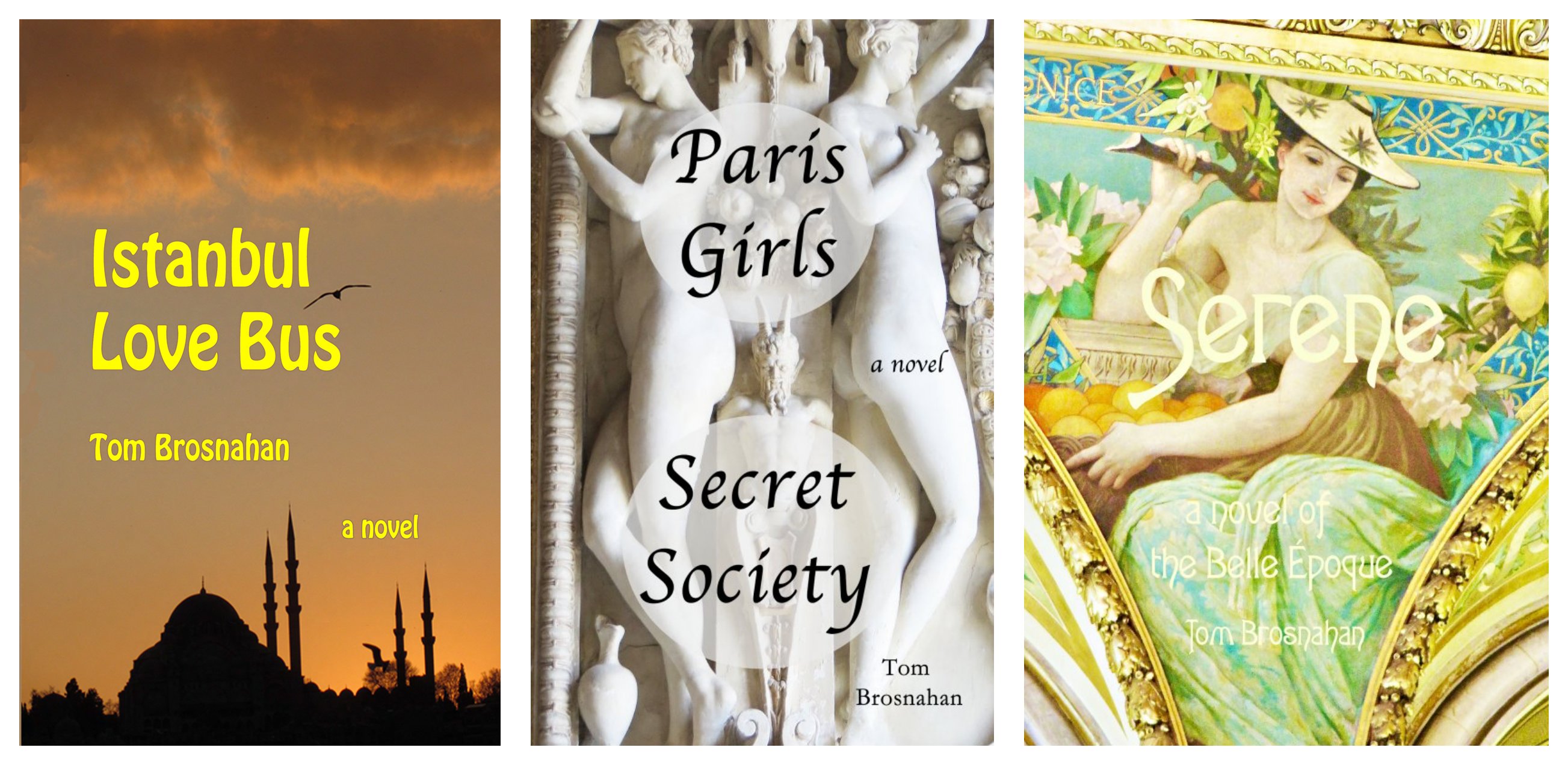New England Literature
Henry David Thoreau, Louisa May Alcott, Ralph Waldo Emerson, Nathaniel Hawthorne, Emily Dickenson, Robert Frost...all the way to Robert Parker.
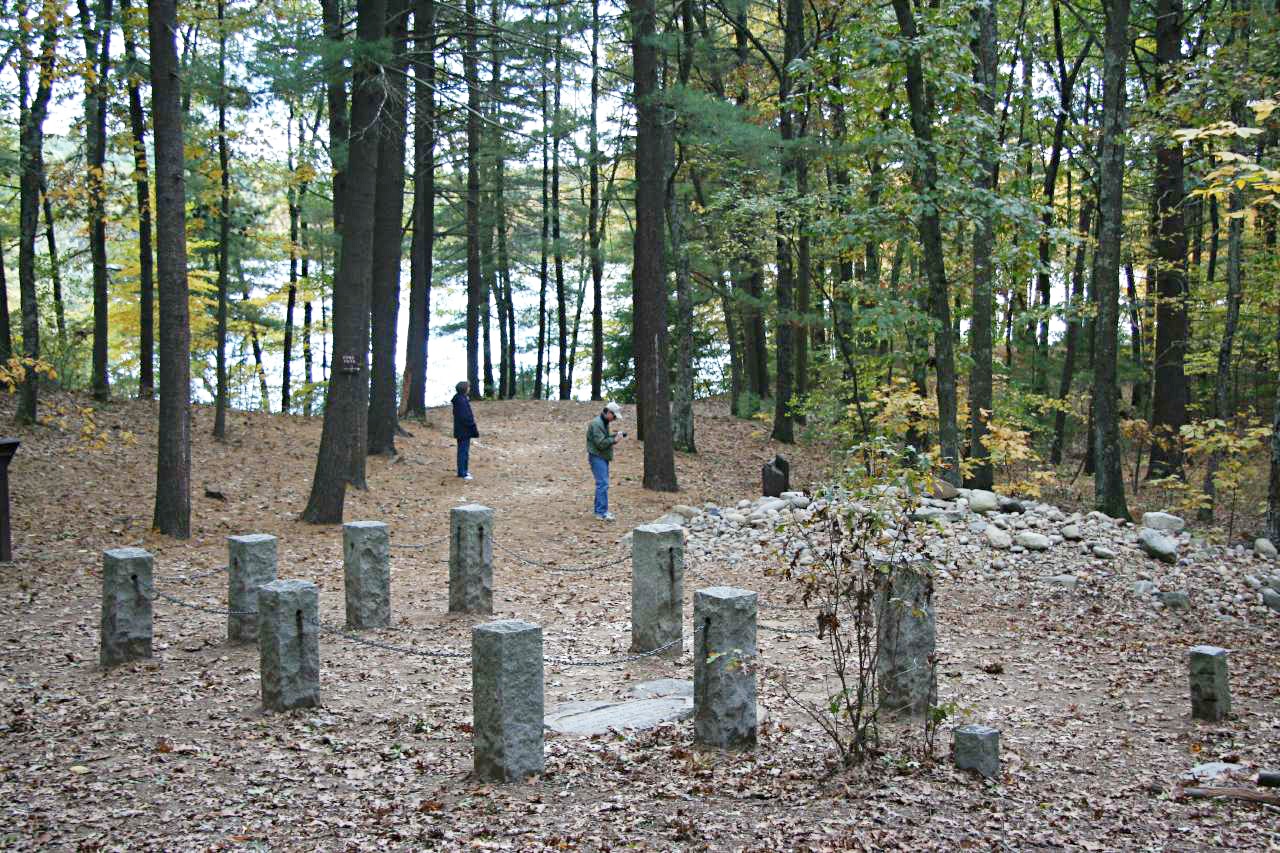
Site of Henry David Thoreau's cottage on Walden Pond, Concord MA.
New England has always been famous for its poets, writers and authors.
The Puritans
From the Puritan sermons and devotional writings of Increase Mather (1639-1723) and his son Cotton Mather (1663-1728), New England literature has come all the way to the punchy Spencer thrillers of Robert B Parker. Along the way, New England has fostered some of America's greatest writers.
In Puritan New England, education was highly valued, for it was through education (meaning theological study) that one came to know God. The region's great colleges and universities—Amherst, Bowdoin, Brown, Dartmouth, Harvard, Tufts, Williams, Yale—were all founded for the training of young men for the ministry. By the late 1800's this theological preoccupation had been abandoned, and New England's colleges became magnets for literati of all beliefs and opinions.
Noah Webster
The runaway bestseller of the early 1800's was not a book of sermons, nor a novel, nor even a history of the late war with England; and the book remains a bestseller to this day. It's the American Dictionary of the English Language, by Yale graduate Noah Webster (1758-1843). First published in 1828, Webster's 70,000-word dictionary was bought by hundreds of thousands of Americans every year—and still is. You can visit his house in West Hartford CT. He is buried in Grove Street Cemetery, New Haven CT.
Ralph Waldo Emerson
Among the writers most closely associated with New England is Ralph Waldo Emerson (1803-1882). Emerson's beliefs in the mystical unity of nature and the divine, and Thoreau's (see below) championing of the simple life in tune with nature's laws, were radical in 19th-century Concord, Massachusetts. Today such unitarian and ecological beliefs are accepted by many people around the world. Along with other writers, Emerson was a founder of the Transcendental movement, and had more effect on American literature than any other New Englander. You can visit his house and walk the Emerson-Thoreau Amble, the path that he and friend Henry Thoreau often followed to Walden Pond. Emerson and his family are buried on Authors Ridge in Sleepy Hollow Cemetery, Concord MA.
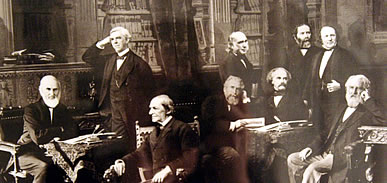
The composite photo above brings together some of New England's greatest literary lights. From left to right: John Greenleaf Whittier, Oliver Wendell Holmes, Ralph Waldo Emerson, John Lothrop Motley, Amos Bronson Alcott, Nathaniel Hawthorne, James Russell Lowell, Louis Agassiz, Henry Wadsworth Longfellow.
Henry David Thoreau
Henry David Thoreau (1817-1862), a friend of Emerson's and graduate of Harvard, is best remembered for Walden, or Life in the Woods(1854). This journal of observations and opinions written during his solitary sojourn (1845-47) on Walden Pond in Concord, Massachusetts, may be the best-known book on New England. Thoreau was also known for Civil Disobedience, and his accounts of walking trips entitled The Maine Woods and Cape Cod. You can walk the Emerson-Thoreau Amble, the path that he and his mentor Emerson walked to Walden Pond, where you can visit the site of Thoreau's cottage. He's buried on Authors Ridge in Sleepy Hollow Cemetery, Concord MA.
Nathaniel Hawthorne
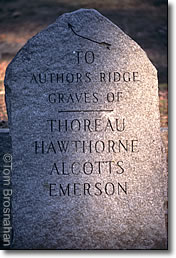 |
|
|---|---|
Waymarker on the path to Authors Ridge in Sleepy Hollow Cemetery, Concord Massachusetts. |
Nathaniel Hawthorne (1804-1864), was born in Salem, Massachusetts, attended Bowdoin College in Maine, then pursued a career which produced The Scarlet Letter, Twice-told Tales, and The House of the Seven Gables. Hawthorne is thought by many to be the writer who established the truly American short story. You can visit The Old Manse and The Wayside in Concord MA, where he and Sophia Hawthorne lived, and also Arrowhead, Herman Melville's house in Pittsfield MA. The Hawthornes are buried on Authors Ridge in Sleepy Hollow Cemetery, Concord MA.
Hawthorne's contemporary, Edgar Allen Poe (1809-1849), was born in Boston, but pursued his career in Virginia.
Henry Wadsworth Longfellow
Among New England poets, the 1800's belonged to Henry Wadsworth Longfellow (1807-1882). Born in Portland, Maine, he attended Bowdoin College, taught at Harvard, and lived in a big yellow house on Brattle Street in Cambridge MA which is now a historic landmark. Several of Longfellow's poems are so much a part of Americana that many forget that he wrote them: Paul Revere's Ride, The Song of Hiawatha, The Village Blacksmith, Excelsior, and The Wreck of the Hesperus are among the better-known ones. He is buried in Mount Auburn Cemetery, Cambridge MA.
Preceding and during the Civil War, New England writers such as abolitionist William Lloyd Garrison (1805-1879) and John Greenleaf Whittier (1807-1892) contributed their literary and poetic talents to the struggle to end slavery.
Mark Twain
Few Americans realize that Samuel Clemens (1835-1910), better known as Mark Twain, settled in Hartford, Connecticut at the age of 35. Though Missouri-born, Twain wrote his masterpieces Tom Sawyer and Huckleberry Finn in Hartford, as well as The Prince and the Pauper, and A Connecticut Yankee in King Arthur's Court. Touring his grand Victorian mansion at Nook Farm is the high point of a visit to Hartford. He is buried in Woodlawn Cemetery, Elmira NY.
Robert Frost
Robert Frost (1874-1963) was born in San Francisco, but his family had lived in New England for generations. He moved to New England early in life, attended Dartmouth and Harvard without taking a degree, and later returned to teach poetry at Amherst and Harvard. His many books capture the quintessence of New England living and the Yankee soul. You can visit his farms, The Frost Place in Franconia NH, the Robert Frost Farm in Ripton VT, and The Robert Frost Farm in Derry NH. Frost is buried in Old Bennington VT.
19th-Century Women
The Industrial Revolution brought New Englanders wealth, and daughters of wealthy manufacturers and merchants were able to turn their energies to education and literature rather than household work. In the 1800's, many excellent New England women's colleges produced graduates instilled with a spirit of independence and self-reliance.
Louisa May Alcott
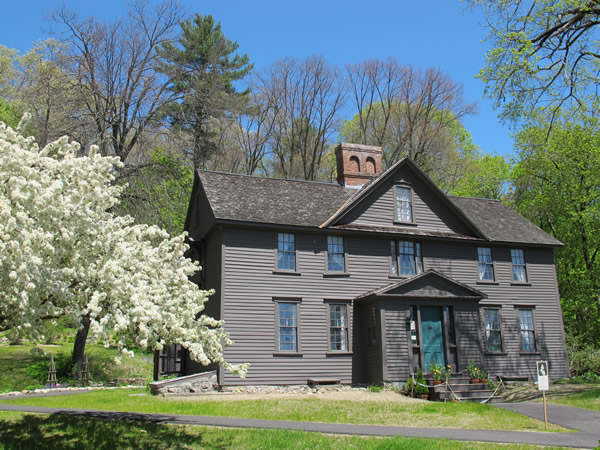
Orchard House, the Alcott home in Concord MA
Louisa May Alcott, daughter of noted teacher and literatus Amos Bronson Alcott, was a storyteller from childhood. Writing to help support her family, her stories and books brought her well-deserved fame and prosperity. Her partly-autobiographical Little Women (1868-69) may be the most successful children's book ever, still in print after a century and a half. Mujercitas in Spanish, Piccole Donne in Italian, Küçük Kadınlar in Turkish, Les quatre filles du docteur Marsch in French—Little Women has been translated into dozens of languages and continues to be enjoyed by children around the world. You can visit The Wayside, Orchard House and Fruitlands where she lived as a child. She is buried on Authors Ridge in Sleepy Hollow Cemetery, Concord MA.
Harriet Beecher Stowe
Harriet Beecher Stowe (1811-1896) felt compelled to expose the injustice of slavery in her novel Uncle Tom's Cabin (1852), which sold an amazing 300,000 copies in one year. She is buried in Phillips Academy Cemetery, Andover MA (near Lowell).
Emily Dickinson
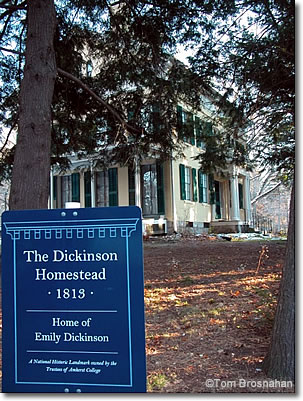
Opposite in temperament to the energetic Ms. Stowe was poet Emily Dickenson (1830-1886), a native of Amherst, Massachusetts, who lived there in near seclusion most of her life. Only seven of her poems were published during her lifetime, but the posthumous editing and publishing of nearly 1,000 poems established her reputation. Her influence on American poetry is matched only by that of Robert Frost. You can visit the Dickinson Homestead in Amherst MA. She is buried in Amherst's West Cemetery.
Katharine Lee Bates
Among New England's other famous female poets is Katharine Lee Bates (1859-1929), a native of Falmouth, Massachusetts and a graduate of Wellesley College. Though much of her work is unfamilar today, every American knows her patriotic hymn, America the Beautiful. She is buried in Oak Grove Cemetery, Falmouth MA on Cape Cod.
New England Books
Most famous of the books about New England life is perhaps Herman Melville's Moby Dick (1851). Though Melville was a New Yorker, his great novel of ambition, will, and struggle with the sea and its creatures is a New England classic.
Two Years Before the Mast (1840), by Richard Henry Dana, with its descriptions of shipboard life, had an important influence on Melville.
The Bostonians (1886), Henry James' novel of Boston manners, is as different from these seafaring books of Melville and Dana as one book can be from another.
For more reading on Bostonians, pick up John P. Marquand's The Late George Apley (1937), which is stylistically similar.
To get the flavor of 17th-century New England, read Nathaniel Hawthorne's The Scarlet Letter (1850), a novel of sin and repentance among the Puritans.
The Last Puritan (1936), by George Santayana, takes Puritan development to its very end by describing a 20th-century Harvard man, descended from Puritans, who still lives by their ideals.
Though Mark Twain's works mostly recall his boyhood in Missouri, you're sure to enjoy A Connecticut Yankee in King Arthur's Court (1889), in which a shrewd Yankee transported back to the days of chivalry shows the knights a thing or two.
Louisa May Alcott's Little Women (1868-69) is a favorite among young visitors to New England, who can even visit the Alcott homestead in Concord MA. Little Men (1871) and Jo's Boys (1886) are sequels.
Henry David Thoreau's Walden, or Life in the Woods (1854), the journal of observations and opinions written during his solitary sojourn (1845-47) on Walden Pond in Concord MA, is perhaps the best-known book on New England. Few people know that Thoreau wrote several other books of New England observations, including The Maine Woods and Cape Cod.
For up-to-date thrills set in Boston and New England, pick up any of the "Spencer" thrillers written by Robert B Parker.
Jaws, by Peter Benchley, is the novel from which the popular motion picture was made.
Interested in lobsters? The book for you is Lobster - A Global History, by Elisabeth Townsend.
